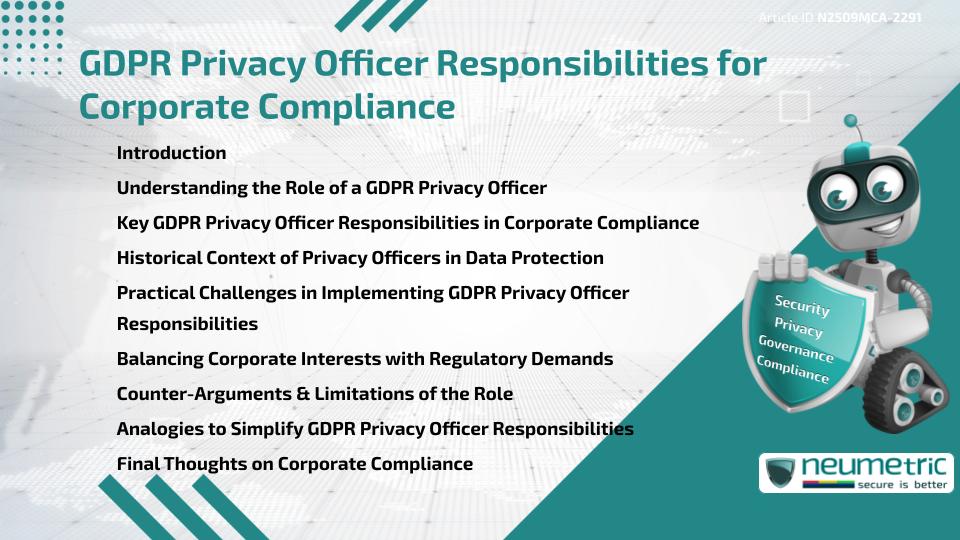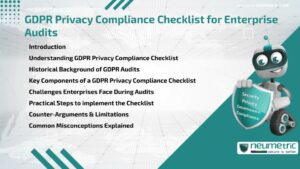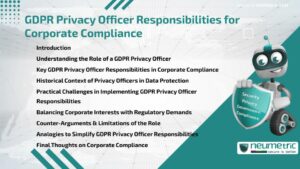Table of Contents
ToggleIntroduction
The GDPR Privacy officer responsibilities are central to helping Organisations achieve compliance with Data Protection laws. These responsibilities involve overseeing data handling practices, monitoring compliance programs, advising on Risk & serving as the primary contact for regulators & Stakeholders. The role is both legal & operational, requiring a balance between protecting individuals’ rights & supporting corporate objectives. Without proper oversight, companies Risk penalties, reputational damage & loss of consumer trust.
Understanding the Role of a GDPR Privacy Officer
A GDPR Privacy Officer, also known as a Data Protection Officer [DPO], acts as the guardian of Personal Data within an Organisation. The officer’s responsibilities include educating staff about Compliance Requirements, conducting audits & ensuring that data is collected & processed fairly. Much like a Financial auditor ensures accountability in money matters, a Privacy officer safeguards the company’s handling of Personal Information.
Key GDPR Privacy Officer Responsibilities in Corporate Compliance
The GDPR Privacy officer responsibilities can be grouped into several categories:
- Advisory Duties: Providing guidance on lawful data processing & maintaining proper documentation.
- Monitoring Compliance: Regularly reviewing Policies, practices & Employee Training.
- Risk Assessment: Identifying areas of Vulnerability & advising management on remedial measures.
- Regulator Liaison: Acting as the communication bridge with supervisory authorities.
- Consumer Support: Addressing requests from individuals about their data rights, such as access or erasure.
These responsibilities make the officer an essential part of a company’s compliance structure.
Historical Context of Privacy Officers in Data Protection
The concept of Privacy officers emerged long before the GDPR. In the 1990s, North America saw the introduction of Chief Privacy Officers to manage growing concerns over digital data. Europe’s approach evolved into a stricter Framework, culminating in the General Data Protection Regulation [GDPR] of 2018. The Regulation formalized the role of Privacy officers, making their responsibilities legally binding in many contexts. This shift underscored the global recognition of Data Privacy as a fundamental right.
Practical Challenges in Implementing GDPR Privacy Officer Responsibilities
Despite their importance, implementing GDPR Privacy officer responsibilities is not without challenges. Some companies struggle with limited resources to support the role fully. Others face internal resistance when compliance measures slow down Business Operations. Additionally, interpreting the Regulation consistently across international offices can be complex. These challenges highlight why companies must invest in clear communication, training & proper resourcing of the officer’s role.
Balancing Corporate Interests with Regulatory Demands
One of the most delicate aspects of the role involves balancing corporate goals with strict Data Protection laws. For example, marketing departments may want to maximize Customer Data usage, while the Privacy officer must ensure this aligns with GDPR requirements. This balance requires diplomacy, negotiation skills & a strong understanding of both law & business strategy.
Counter-Arguments & Limitations of the Role
Critics argue that the GDPR Privacy officer responsibilities may slow innovation & burden businesses with excessive bureaucracy. Others question whether smaller Organisations truly need such a formal role when their data use is minimal. While these points are valid, the Regulation addresses them by allowing flexibility in whether an officer is mandatory, based on data volume & type. In practice, even small companies often benefit from structured oversight to avoid costly mistakes.
Analogies to Simplify GDPR Privacy Officer Responsibilities
To simplify the concept, think of the GDPR Privacy Officer as similar to a safety inspector in a factory. Just as the inspector ensures machines are safe to use, the officer ensures that data handling processes are safe, lawful & respectful of individuals’ rights. Both roles may sometimes feel restrictive, but they prevent accidents that can harm people & Organisations alike.
Final Thoughts on Corporate Compliance
The GDPR Privacy officer responsibilities form the backbone of corporate compliance in the digital age. They provide accountability, protect individuals’ rights & ensure that businesses can thrive without compromising trust. By appreciating the role’s history, challenges & analogies, companies can better integrate this function into their corporate Governance structure.
Takeaways
- The GDPR Privacy Officer is vital for protecting data & ensuring compliance.
- Responsibilities include monitoring, advisory duties, Risk Management & regulator liaison.
- The role balances corporate interests with strict Regulatory Standards.
- Challenges exist but can be managed through adequate resources & clear communication.
- The officer functions much like a safety inspector, preventing harm before it occurs.
FAQ
What are the main GDPR Privacy officer responsibilities?
They include advising on lawful data processing, monitoring compliance, assessing Risks, liaising with regulators & supporting consumer rights requests.
Is a GDPR Privacy Officer mandatory for all Organisations?
No, the GDPR requires one only if the organisation processes large amounts of Personal Data or handles Sensitive Data types.
How does a GDPR Privacy Officer help with corporate compliance?
They ensure that the company follows legal requirements, reducing Risks of fines & reputational damage.
What challenges do GDPR Privacy Officers face?
Common challenges include resource limitations, conflicting corporate interests & the complexity of international compliance.
Can a Small Business benefit from a GDPR Privacy Officer?
Yes, even Small Businesses benefit from structured oversight, as it prevents costly mistakes & builds Customer Trust.
How is a GDPR Privacy Officer different from a compliance officer?
While both ensure adherence to rules, the GDPR Privacy Officer focuses specifically on Data Protection & Privacy regulations.
Who does the GDPR Privacy Officer report to?
They typically report to the highest level of management, ensuring independence & authority.
Need help for Security, Privacy, Governance & VAPT?
Neumetric provides organisations the necessary help to achieve their Cybersecurity, Compliance, Governance, Privacy, Certifications & Pentesting needs.
Organisations & Businesses, specifically those which provide SaaS & AI Solutions in the Fintech, BFSI & other regulated sectors, usually need a Cybersecurity Partner for meeting & maintaining the ongoing Security & Privacy needs & requirements of their Enterprise Clients & Privacy conscious Customers.
SOC 2, ISO 27001, ISO 42001, NIST, HIPAA, HECVAT, EU GDPR are some of the Frameworks that are served by Fusion – a SaaS, multimodular, multitenant, centralised, automated, Cybersecurity & Compliance Management system.
Neumetric also provides Expert Services for technical security which covers VAPT for Web Applications, APIs, iOS & Android Mobile Apps, Security Testing for AWS & other Cloud Environments & Cloud Infrastructure & other similar scopes.
Reach out to us by Email or filling out the Contact Form…





